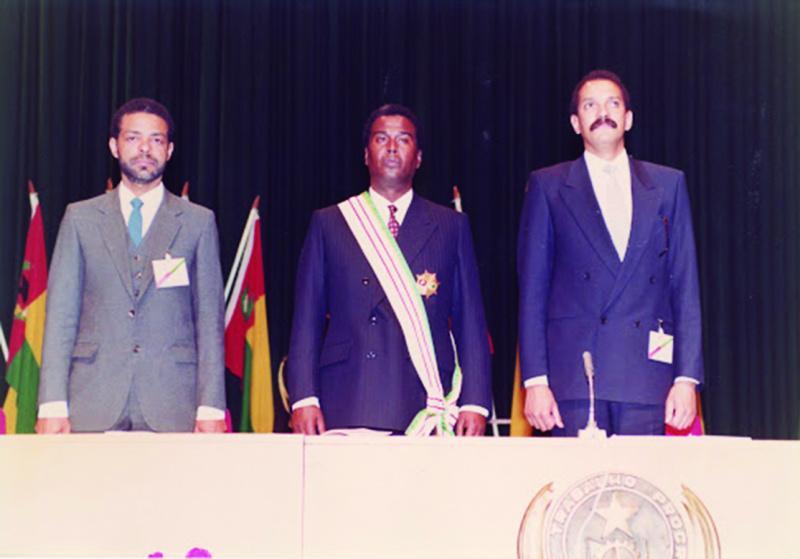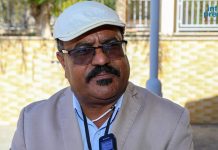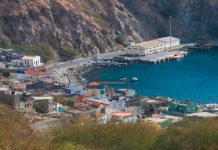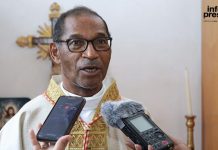
By ANTÓNIO MONTEIRO ,
Africa-Press – Cape verde. The first President of the II Republic would turn 80 years old next Friday, February 16th. This event set the tone for the interview with Amílcar Spencer Lopes, who was the President of the National Assembly that conferred office on the former President of the Republic. Spencer Lopes remembers the statesman as a convinced and coherent democrat and an example of rigor, demand, long-term vision and social and institutional solidarity. “He was a man of great qualities: he was intelligent, thoughtful, discreet and, moreover, a well-educated and cultured person. Therefore, he had great moral authority”, emphasizes Amílcar Spencer Lopes.
Mascarenhas Monteiro would have turned 80 years old on February 16th. He was the first President of the Second Republic. And also the youngest in the history of our independent country?
Yes, Dr. António Mascarenhas Monteiro was the first President of the Republic of Cape Verde to be elected by universal and direct suffrage, in free, competitive and participated elections. When he was elected in 1991, he was 47 years old. It therefore seems to me that until now, he was the youngest President of Cape Verde.
Whether he was the best President is another question.
I wouldn’t want to go down that route of comparing him to others. What I can say is that he was a good President of the Republic. The right man, at the right time, who performed the role with great dignity and competence and to whom the country owes a huge debt.
What is the legacy of Mascarenhas Monteiro in the Construction of the Cape Verdean Democratic Rule of Law?
President Mascarenhas Monteiro was a man who was always concerned about the often precarious conditions in which Cape Verdeans lived on these islands. What he liked to call the real country. In this way, once elected President of the Republic, he sought to exercise this high magistracy for the good of the country and Cape Verdeans. First, by example of rigor, demand, long-term vision and social and institutional solidarity. He was a man of great qualities: he was intelligent, thoughtful, discreet and, moreover, a well-formed and cultured person. He therefore had great moral authority. He was, on the other hand, a staunch and consistent Democrat. Therefore, he sought to work with all established powers – National Assembly, Government, Judiciary, Municipalities and representatives of Civil Society, in general, in order to promote the sustainable and lasting development of these islands and favor economic well-being, social and cultural, of populations, especially in rural areas. But development is not a linear path, nor is democracy a given; there is always progress and setbacks. Hence, the requirement for permanent attention, some flexibility and, above all, coherence throughout the process. I think that, thanks to the attributes he possessed and to which I have already mentioned, he was able to exercise a true magistracy of influence and ensure that the boat of our daily journey continued, safe and sound, on the path of freedom and consolidation of the nascent State of Democratic Law.
The right man, at the right time, who performed the role with great dignity and competence and to whom the country owes a huge debt.
The approval of the 1992 Constitution is considered one of the important events of the First Republic because it marked the change of regime. But there was some reticence on the part of Mascarenhas Monteiro in promulgating the Constitution. Why?
The approval and entry into force of the 1992 Constitution is a milestone in the recent history of these islands. I believe that the three important dates of the young Republic of Cape Verde are the 5th of July (1975), the 13th of January (1991) and the 25th of September (1992). I don’t know if “reticence” is the correct term to express the then President’s position at the time. He understood that the Constitution was good. However, he felt that the approval process would not have been the best, either from the point of view of achieving a greater and better consensus around the form of Government, or from a legal-formal point of view. In fact, he expressed this very thing, in one of his most successful statements, in the message he intended to address to the Nation, at the time. Having explained his reasons, he decided, however, to promulgate the constitutional law, taking into account the country’s best interests.
Mascarenhas Monteiro, in his speech on the occasion of the promulgation of the Constitution, lamented that the constitutional text was approved without the participation of all the nation’s elected officials.
Yes! But it must be noted that it would be very difficult to achieve unanimity on such a sensitive matter. For all intents and purposes, the required qualified majority had been respected. I would say that, for something, the Cape Verdean people had attributed this majority to the MpD. And this, in my view, is the great meaning of January 13th: the unequivocal expression of what Legal Science calls a new idea of Law .
He also stated that it is not enough for a Constitution to be modern. It has to reflect the society for which it is intended.
Well, the truth is that the President of the Republic had been elected under the 1980 Constitution, with the changes that had been introduced in the meantime, in order to allow the transition to democracy. Therefore, with the new Constitution and the option made for a new system of Government, the President’s powers were, necessarily, reduced. Now, he had been elected and had taken office under the aegis of the old Constitution. He therefore thought that these circumstances should be considered. He understood, however, that this “new idea of Law” had to prevail. Rigor is not to be confused with rigidity.
He [Mascarenhas Monteiro] sought to work with all established powers – National Assembly, Government, Judiciary, Municipalities and representatives of Civil Society
What Mascarenhas thoughtMonteiro of our Cape Verdeanness?
In my opinion, Cape Verdeanness was one of the key ideas in his thinking and action. It appears mentioned in several points of his public speeches and it was his (President Mascarenhas Monteiro’s) idea for the important initiative “Summer 91 – Meeting of Cape Verdeanity”. See, National Independence brought us liberation from the colonial yoke, but then we were somewhat emasculated in our freedom to think, to express freely, to express and debate issues relating to our identity. With the advent of democracy, it was urgent to create spaces for dialogue and participation, which would involve citizens in the noble task of realizing democratic ideals and consolidating institutions and the democratic process. He understood that Cape Verdeanness – translated into the common and sedimented consciousness of uses, customs, language and other forms of culture – was a unifying factor for the entire nation and a condition for the construction of democracy itself.
In the gallery of Cape Verdean historical figures, on which pedestal would you place Mascarenhas Monteiro?
It won’t just be my opinion: The late President António Mascarenhas Monteiro will always, undoubtedly, and on his own merit, have a permanent place in the gallery of Cape Verde’s great historical figures.
expressodasilhas.cv
For More News And Analysis About Cape verde Follow Africa-Press





